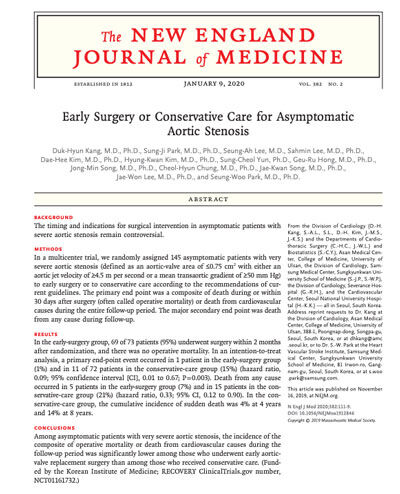Surgeon Q&A: Early Surgery for Asymptomatic Aortic Stenosis Patients?
Written By: Adam Pick, Patient Advocate, Author & Website Founder
Medical Expert: Joanna Chikwe, MD, Chair of Cardiac Surgery at Cedars-Sinai Medical Center
Published: February 15, 2023
Aortic stenosis is a dangerous and tricky type of heart disease for many reasons. First, the severity of aortic stenosis can vary from mild to severe. Second, aortic stenosis can progress at different rates. Third, some patients are symptomatic (fatigue, shortness of breath, chest pain) while other patients are asymptomatic. Fourth, aortic stenosis can be fatal.
For these reasons, patients and their cardiologists are often confused about whether-or-not aortic stenosis surgery should be performed earlier than later. For example, Carrie recently asked me, “I’m 75 years old. I was diagnosed with aortic stenosis five years ago. I’m in the ‘waiting room’ and starting to dial down my life. Not fun! My cardiologist still thinks that I don’t have symptoms. What is the latest research on timing aortic stenosis surgery for patients who are mildly symptomatic or asymptomatic?”
Carrie asks a very important question. To learn more about early surgery for asymptomatic aortic stenosis patients, I contacted Dr. Joanna Chikwe, the Chair of Cardiac Surgery at Cedars-Sinai Medical Center in Los Angeles, California. In our community, Dr. Chikwe has successfully treated many aortic stenosis patients including Elizabeth Walker and Timothy Fitzgerald.
Key Learnings About Early Surgery for Aortic Stenosis
- Aortic stenosis is deadly form of heart disease in which the aortic valve is narrowed thereby preventing proper blood flow through the heart. Aortic stenosis can cause symptoms including shortness of breath, fatigue and chest pain. If severe aortic stenosis is not treated, 50% of patients who experience symptoms are dead within 24 months.
- In the past, many cardiologists and surgeons have waited for the onset of symptoms to recommend the surgical or transcatheter treatment of aortic stenosis. As Dr. Chikwe states, “Traditionally, yes, we used to wait for symptoms before we treated, but that’s really shifted.”
- Given new research, medical teams are re-evaluating the timing of aortic stenosis surgery that may including a more aggressive approach for patients who are not symptomatic. “I think the latest research which supports a much more aggressive approach, which means fixing that valve before you feel symptoms,” states Dr. Chikwe. “In a randomized trial that was published in the New England Journal of Medicine in 2020, that really showed better outcomes, better survival in patients who didn’t wait until they had symptoms.”

- The two main types of aortic stenosis treatment include surgical aortic valve replacement (SAVR) or transcatheter aortic valve replacement (TAVR).
- Dr. Chikwe’s advice for patients with aortic stenosis who are asymptomatic is to have an in-depth conversation with their cardiologist about the severity of their disease and their symptoms. Patients may need a “stress-test” on a treadmill to better understand how their aortic valve and heart are functioning. “Your cardiologist may need to see how you feel and how you perform when you exercise in a monitored setting, for example, on a treadmill,” states Dr. Chikwe. “That may give them enough information to make a really good decision about early intervention on your valve.”
Many Thanks to Carrie, Dr. Chikwe and Cedars-Sinai!
Thanks to Carrie for asking this very important question! A special thanks goes out to Dr. Chikwe for sharing her experiences and clinical research about timing aortic valve surgery. And, many thanks to the Cedars-Sinai team for taking such great care of heart valve patients!
Keep on tickin!
Adam
P.S. For the deaf and hard of hearing members of our community, I have provided a written transcript of Dr. Chikwe’s video interview below.
Video Transcript:
Adam: Hi, everybody. It’s Adam with HeartValveSurgery.com, and today we’re answering your questions all about early surgery for asymptomatic aortic stenosis patients. I am thrilled to be joined by Dr. Joanna Chikwe, who’s the Chair of Cardiac Surgery at Cedars-Sinai Medical Center in Los Angeles, California. During her fantastic career, Dr. Chikwe has performed thousands of cardiac procedures with many involving heart valve repairs and heart valve replacements. Dr. Chikwe, it is great to see you again, and thanks for being with us today.
Dr. Chikwe: Oh, it’s a pleasure to be with you again, Adam.
Adam: Yeah, Dr. Chikwe, we’re answering patient questions today, and this one comes in from Carrie. She asks: “Hi, Adam. I’m 75, and I was diagnosed with aortic stenosis five years ago. I’m in the waiting room and starting to dial down my life. Not fun. My cardiologist still thinks that I don’t have symptoms. What is the latest research on timing aortic stenosis surgery for patients who are mildly symptomatic or asymptomatic?”
Dr. Chikwe: That’s a really important question because aortic stenosis, of all of the valve problems, is one that really doesn’t have a great outcome if it’s not treated. Traditionally, yes, we use to wait for symptoms before we treated, but that’s really shifted. I think the latest research which supports a much more aggressive approach, which means fixing that valve before you feel symptoms, is a randomized trial that was published in the New England Journal of Medicine in 2020, and that really showed better outcomes, better survival in patients who didn’t wait until they had symptoms. These days you have two options which you should discuss with your cardiologist. It’s not surgery. Transcatheter aortic valve replacement, TAVR, where the valve is replaced through an artery in your leg is also a reasonable option for many, many patients.
Adam: Dr. Chikwe, so for Carrie, who is hearing that, mm, hold off a little bit, don’t need surgery yet but she’s dialing down her life, what would be your recommendation for her?
Dr. Chikwe: I think a really clear conversation again with your cardiologist. For example, your cardiologist may need to see how you feel and how you perform when you exercise in a monitored setting, for example, on a treadmill. That may give them enough information to make a really good decision about early intervention on your valve.
Adam: Carrie, I hope that helped you. I know it helped me. Dr. Chikwe, as always, thanks for taking time away from your very busy practice there at Cedars-Sinai in Los Angeles and sharing this insight and research with our patient community.
Dr. Chikwe: Thank you so much, Adam. It is always a pleasure.






